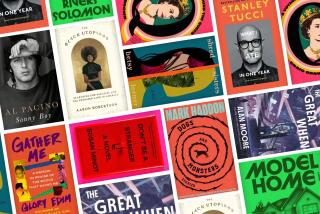Books 2012: David L. Ulin
What made 2012 a compelling year in reading? For me, it was the return of the novel of ideas. These are novels that both portray and reflect upon the spirit of their moment, telling not just a story but using it to illustrate something about the world in which we live. It’s been an endangered form since at least the early 1960s, when Philip Roth wrote that reality “is continually outdoing our talents, and the culture tosses up figures daily that are the envy of any novelist.”
PHOTOS: David L. Ulin’s top 10 books for 2012
This seems an especially prescient observation these days, when public and private blur together and information travels at the speed of light. What is the value, in such a landscape, of consideration, of the way a great work of fiction has of taking the pulse of its time? Do we even have space anymore for the vertical plunge required by the novel, the deep dive into a writer’s inner world?
In 2012, anyway, the answer was a resounding yes, as a number of novelists published work that challenged us not only with its content but also with its form. The best of these — by Steve Erickson, Hari Kunzru, Lydia Millet, Zadie Smith, Chris Ware — I’ve cited in my favorite books list because they give me faith in the power of the novel to explain, for a moment anyway, the ongoing tussle of daily life.
Such a tussle, of course, is both universal and particular; as Jane Smiley writes in “Thirteen Ways of Looking at the Novel,” one of the great pleasures of reading fiction is the sense it gives us “of the reality of other consciousnesses,” even as those consciousnesses reflect our own. What they are wrestling with, we are wrestling with also; what they observe, we often observe as well.
I think of Leah, one of four central characters in Smith’s “NW,” lost in the corridors of her consciousness, struggling with mortality, with community, with the need to find some meaning that doesn’t fade. I think of Ware’s graphic novel “Building Stories,” a book that by its very form — 14 disconnected chapters — mirrors the fragmentation and dislocation of modern life. I think of the family at the center of Kunzru’s “Gods Without Men,” plugged into the fast track, acolytes to the economy of data, until a series of events they can’t understand catapults them into a more elemental terrain.
Every one of these writers frames his or her stories in a larger context, in which understanding is elusive, conditional even, and it can be hard to put what matters into words. This is an idea that has always been with us, and yet it seems to occupy our culture in a whole new way. How do we find our place in a world where the pathways have exploded? How do we carve a passage back to who we are?
That’s what the novel of ideas does: It raises questions, even (or especially) if it can’t answer them. It’s in the asking, after all, that literature is made. As Erickson writes in “These Dreams of You”: “What lapse of perspective undid him? What ambition failed him? What did he take for granted? What did he value too much or too little? What thing was undone that should have been done, or what was done that shouldn’t have been? To what dream did he commit himself that was folly? How is it that he was so old when he was so young, and how has he now been reduced to something so childish even as he’s so old?”
More to Read
Sign up for our Book Club newsletter
Get the latest news, events and more from the Los Angeles Times Book Club, and help us get L.A. reading and talking.
You may occasionally receive promotional content from the Los Angeles Times.








